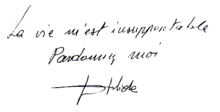
A suicide note or death note is a message written by a person who intends to die by suicide.
A study examining Japanese suicide notes estimated that 25–30% of suicides are accompanied by a note. However, incidence rates may depend on ethnicity and cultural differences, and may reach rates as high as 50% in certain demographics. A suicide message can be in any form or medium, but the most common methods are by a written note, an audio message, or a video.
Reasons
Some fields of study, such as sociology, psychiatry and graphology, have investigated the reasons why people who complete or attempt suicide leave a note.
The most common reasons that people contemplating suicide choose to write a suicide note include one or more of the following:
- To ease the pain of those known to the victim by attempting to dissipate guilt.
- To increase the pain of survivors by attempting to create guilt.
- To set out the reason(s) for suicide.
- To send a message to the world.
- To express thoughts and feelings that the person felt unable to express in life.
- To give instructions for disposal of the remains.
- Occasionally, to confess acts of murder or some other offence.
Sometimes there is also a message in the case of murder-suicide, explaining the reason(s) for the murder(s), see for example, Marc Lépine's suicide statement and videotaped statements of the 7 July 2005 London bombers.
See also
- Death poem – Genre of poetry
- Deathbed confession – Manner of confession
- Last words – Final words attributed to a person before their death
- Will and testament – Legal declaration where a person distributes property at death
References
- SHIOIRI, TOSHIKI; NISHIMURA, AKIYOSHI; AKAZAWA, KOHEI; ABE, RYO; NUSHIDA, HIDEYUKI; UENO, YASUHIRO; KOJIKA-MARUYAMA, MAKI; SOMEYA, TOSHIYUKI (April 2005). "Incidence of note-leaving remains constant despite increasing suicide rates". Psychiatry and Clinical Neurosciences. 59 (2): 226–228. doi:10.1111/j.1440-1819.2005.01364.x. PMID 15823174. S2CID 28986718.
- Olson, Lenora (2005). The Use of Suicide Notes as an Aid for Understanding Motive in Completed Suicides (Thesis). University of Utah.
- "Suicide note reveals murder confession". London: bbc.co.uk. 1971-07-14. Retrieved 2008-10-28.
- "Man jailed for murder in lay-by". London: bbc.co.uk. 2008-03-01. Retrieved 2008-10-28.
- "Suicide note found in murder-suicide case". cbc.ca. 2000-06-23. Archived from the original on December 19, 2008. Retrieved 2008-10-28.
External links
- A collection of suicide notes and letters
- The Presentation of the Self in Suicide Notes by David Lester & Bijou Yang